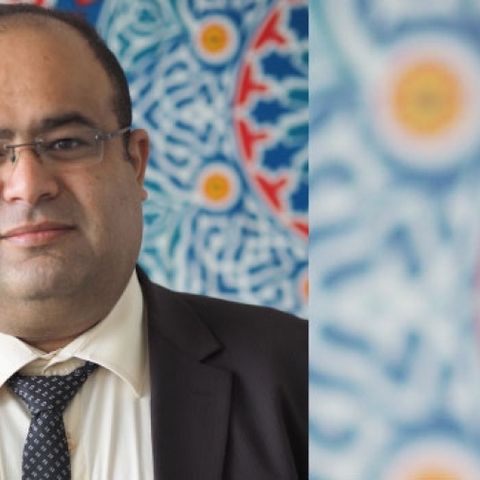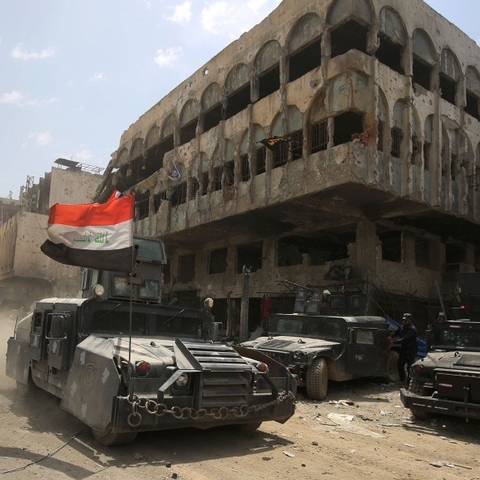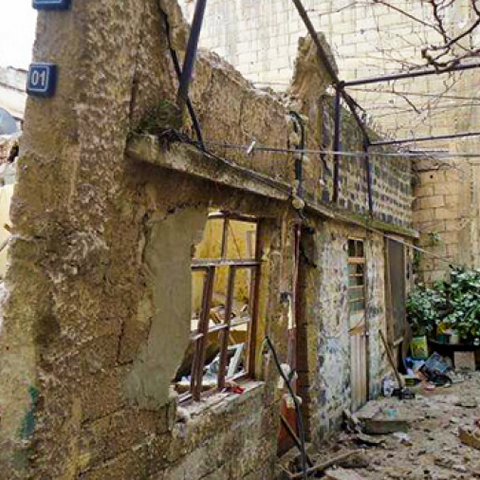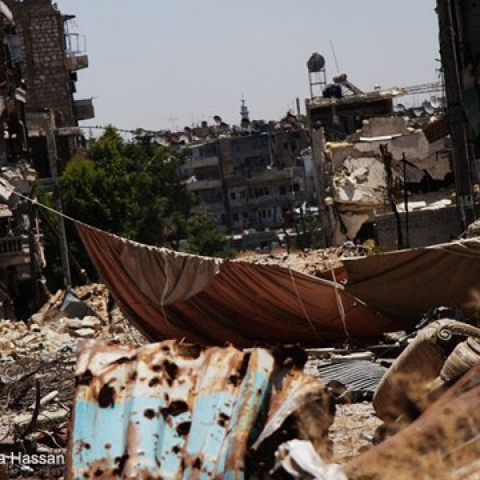Now that there are no limits, we can think in a collective Syrian way
An interview with Azad Milî - a Syrian leftist Kurdish activist – about the prospects of different nations living together in the new Syria
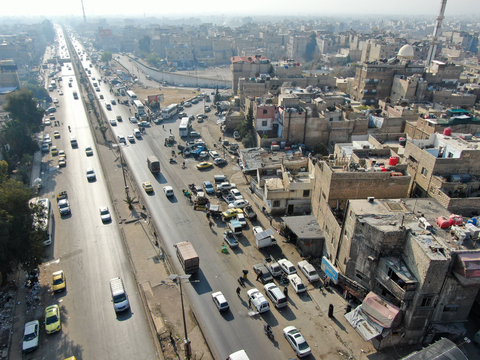
IMAGO / NurPhoto
Ansar Jasim met Azad during his first visit after the fall of the Syrian regime in Damascus. The interview was recorded online on 21 January 2024 while Azad was in Raqqa, where he is conducting a project on social cohesion after the fall of the Assad regime.
Ansar: How are you doing now, Azad, how are you feeling?
Azad: I am very excited. We just hoisted the flag of the Syrian Revolution in the middle of the city. While the autonomous self-administration[1] hoisted the flag at the official state institutions some weeks ago, as activists, we considered this not enough. There should be a flagpole in every city, so they invited us activists to raise it.
At the same time, there are not many positive indicators concerning the caretaker government. Mohammad al-Jolani[2] acts as if he is running things alone.
Ansar: Then isn’t it a bit of a contradiction that you just hoisted the flag?
Azad: The revolutionary flag has no relation to Jolani. This is the flag of the revolution. Under this revolution, many people died, and it stands for the principles of freedom [and for] the unity of the Syrian people.
Anyway, Jolani hates this flag and used to burn it. It is only recently that he has accepted it. So we are not holding the flag of HTS[3] but the flag of the free Syrian Republic.
Ansar: How do you define the Kurdish question in Syria today and the broader question of different nations living together in one country?
Azad: Talking about the Kurdish cause in Syria means the need to talk about North and East Syria, specifically Raqqa, Deir ez-Zor, and Al-Hasakah. This region was called the “duck beak” due to its geographical shape. Today, it is known as the Jazira, or, more broadly, Euphrates. This area has been outside the interest of the Syrian state since the days of the monarchy and during the first republic. Even during the first Syrian national conference in 1919, it wasn’t represented as a region. This continued throughout the French mandate and after independence. Later, the Syrian state developed an interest in the region due to its rich agricultural and oil resources. But the area remained underdeveloped. Only in the late nineties was a university founded.
Seventy percent of Syrian oil comes from these areas, but there is no oil refinery — there is almost no industry. Wheat is planted but not processed because the mills are in the Western coastal region.
Be they Kurds, Arabs, or Assyrians in this area of Syria, they were all suppressed in their national and political rights.
Ansar: …then how did political organizing for the cause evolve in Syria?
Azad: The Kurdish cause developed in Syria in the 1920s with the Khoyboun (Xoybûn) organization, which proposed a national Kurdish agenda. In 1957, the first Kurdish party was founded. The Kurdistan Democratic Party of Syria openly practiced its politics in Syria and advocated for the cultural and national rights of Kurds in Syria. But as part of the union with Egypt (1958–61),[4] all Syrian parties were dissolved and actively persecuted, be they the Kurdish parties, the communists, or even the Ba’ath Party. When then the Syrians claimed secession from Egypt through a military coup in 1961, the new actors in power chose the name “Syrian Arab Republic” and continued to suppress the Kurdish Party by detaining its leadership, who had been planning to run for the Syrian parliament. The history of the Kurdish cause in Syria is long and complex. But the Kurdish cause today means not only the cultural and national rights of the Kurds but also the dissolution of racist projects such as the “Arab Belt,” [5] the “Exceptional Census,” [6] and the Arabization of the Kurdish villages. It also means a unique Kurdish curriculum for the majority Kurdish areas. Today, there are many Kurdish parties, and their visions differ - most advocate for cultural and national rights within Syria. Their visions differ concerning the political system: centralism, de-centralism, or federalism. Some want an Iraqi-style federalism, and others only want administrative decentralization. In my understanding, the Kurdish cause in Syria differs from the cause in Turkish-Kurdish, Iraqi-Kurdish, and Iranian-Kurdish areas due to the distance between the different majority-Kurdish areas (Kobani, Al-Hasakah, Afrin) and the spread of Kurds throughout the county. More than one million Kurds are living in Damascus and Aleppo. Therefore, I think the strongest political voices — even the PYD [Democratic Union Party, a leftist Kurdish party founded in 2003] and the autonomous self-administration — are vowing [to achieve] a form of administrative decentralization or a federal Syrian system which is organized according to different geographies but not sects or nations.
Ansar: Regarding the proposal for a form of administrative decentralization beyond sectarian or ethnic categories and the argument that this is the backbone of justice for Syria — could you explain this in a bit more detail?
Azad: This model is suitable for the Syrian reality. Even before 2011, every area of Syria had witnessed tremendous violence, be it the Hama massacre of 1982, the following violence against Aleppo and Idlib, the massacre in Al-Qadmus in 2001, Suwayda and Qamishli in 2004, etc., and the continuous violence until the fall of the regime on 8 December 2024.
The country is destroyed today, and the regime left many problems that will take decades to solve. This is why geographical and administrative decentralization is necessary. All areas in Syria are mixed; you cannot organize according to nationality or sect. In the Jazira it is not only Kurds who live there; the coastal areas are not only Alawites; Hama and Homs are not only Sunni, as much as Suwayda is not only Druze.
Geographic administrative decentralization means taking these regional specificities seriously and dealing with them on a local level. However, the interior, the foreign ministry, and the army should be run through the centralized ministries.We need a separation of powers and a separation of religion from the state.
This is linked to the question of transitional justice in Syria, and here we have a dilemma: could someone from the coastal region who fought with the regime and was also harmed by the war be compensated like the victims on the side of the Syrian revolution? What is the approach to local mercy that has to happen to make it possible to put all victims on the same level? I feel this is possible on a local level and linked to the way we will in future use our local resources. Therefore, I propose something I call “justice of place”. This can ensure:
- Equitable distribution of resources and services among all regions and ethnic groups.
- Balanced development that ensures that reconstruction and investment projects reach the most affected and historically-marginalized areas.
- Local participation in planning and decision-making to ensure that power does not remain centralized and impose unfair policies on the periphery.
This means that the people living in the Jazira, who bear the brunt of the harm from oil production, also benefit more from these resources. After decades of extractivist policies for Syria’s local resources, 53 years of Ba’ath party rule, and 14 years of large-scale destruction and killing, a non-centralized administrative rule seems the right one to me. However, this kind of political system will only be possible if all parts of Syrian society participate in the transitional phase and we develop a constitution that is the expression of Syria and all its diversity.
Ansar: How do you assess the current phase, and what has changed for you from the North-East after 8 December 2024?
Azad: Before 8 December, we had four ruling authorities in Syria. We can consider them de facto governments, as each imposed itself on the respective areas — North West Syria, Northern Aleppo, North and East Syria, and the areas under regime control. Now, with the fall of the Syrian regime, [the respective regions of] Syria are open to each other, except the Turkish-occupied area, the current attacks on the North East, and probable new Turkish occupations. The war in Syria is over with the exception of the war of Turkey and its mercenaries.
The “transitional administration” of Ahmed al-Sharaa said — and the self-administration confirmed — that the forces attacking the North East are not part of the forces that underpin the rule of the Ministry of Defence. Those attacking the areas in the North East, besides Turkey, are Iranian militias and leftovers of the Syrian regime.
The current discourse from all sides is very planless, be it the self-administration, Ahmed al-Sharaa, the Syrian coalition, the Moscow regime…,or any of those oppositional bodies. Everyone today is faced with new choices.
Some want administrative; others want political decentralization, and others want a federal system. Some want a civil state, others a central Sunni state with Sharia law as the main basis. In order to get out of the bottleneck situation, we need the caretaker government to call in the national conference7 with all political players, and the self-administration is part of this. All Syrian factions need to be represented. In such a conference, the current Syrian constitution needs to be officially overturned, and a transitional phase needs to be declared with principles above the constitution and clear steps for the future. Then, a committee for the transitional phase and for the work on the constitution needs to be formed. Some voices want to reiterate a specific form of Syrian state now, and [they] clearly support Ahmed al-Sharaa. From my perspective, those are especially the remnants of the old regime. Those are the Shabiha8 that changed sides. They use clear hate speech now against Kurds but also against Alawites. It is clear that those who agitate for the use of violence are remnants of the regime that dressed in the clothes of the revolution. They have no history in the revolutionary civil movement and do not advocate for a civil state. This is why we really need the national conference.
We need to have a guardianship from the Arab states and the international community for these steps, this will block the way for Turkey too. Without this support, the process might fail.
Ansar: How might this international support look?
Azad: The sanctions need to be gradually removed. There needs to be support for the Syrian economy to recover, especially in the realm of health. The living standards of Syrians need to be raised. There is a need for support for the reconstruction. The revitalization of the Syrian economy is part of peacebuilding. As long as the people are hungry, there cannot be reconstruction. If the sanctions stay, there will be actors that will exploit the situation.
The international and Arab community today can help Syria economically and technically and provide specialized experts. We want a Syrian process — what happened in Iraq, where [Paul] Bremer9 dictated the constitution to the people of Iraq, is not suitable for our situation.
Ansar: How do you envisage the Kurdish representation in the national conference?
Azad: Jolani talks about inviting individuals, not political blocs, religious sects, or national representatives, to the conference. There needs to be a delegation from the North East with Kurds, Arabs, Armenians, Circassians, and Turkmen representatives. However, civil society and the feminist movement also need to be represented. The autonomous self-administration, as well as the Kurdish National Council, need to be represented. As long as these aspects are not so clear, I remain sceptical.
Ansar: Many groups throughout the country share your point of view and therefore aim to build a democratic alliance as a counter-force to the de facto authority. What is the alternative for the conference?
Azad: If the conference is not planned in an inclusive manner, I aim to gather all the political actors outside of HTS to form an alternative conference. We need to be a parallel force to Ahmed al-Sharaa and clearly say no. Such a conference could be held in Suwayda or North and East Syria, or even outside of Syria. However, we need to exert pressure on Al-Sharaa in order to organize a conference that gains legitimacy through the involvement of all democratic forces.
Here is where I currently see the role of the autonomous self-administration as a parallel and counter-force to Ahmed al-Sharaa that has the power to say no.
Ansar: Could the autonomous self-administration bring all people in North and East Syria together?
Azad: Because the regime is gone, all options are open to Syrians today. I think there is a not-so-insignificant force that supports the vision of the self-administration, specifically Mazloum Abdi.10 For me they are a leftist force that can counter Islamist tendencies in Syria.
The Syrian Democratic Forces (SDF) have international support and, in terms of numbers, count on around 120,000 fighters, which is around three times the forces of HTS. The SDF is not a Kurdish force — in fact, most of its fighters are Arabs. The SDF does not have the nationalist Kurdish approach like the Peshmerga in Iraq. This is why I really think that the SDF or the self-administration can play an important role in pressuring Ahmed al-Sharaa to organize a national conference for all Syrians to build theThird Syrian Republic. Ansar: Do you mean this also as a long-term suggestion to spread the model of the self-administration to all of Syria or rather as a tactic for the current stage?
Azad: I think this is a tactic, to ensure that the system for new Syria is democratic.
However, people also find that names such as “self-administration” are a little too much. I think the self-administration can be a model for all of Syria if you make some reforms and, most of all change, its name. When I traveled through Syria after the fall of the regime, I met many people that expressed that they don’t want to live in a centralized state like in the last 53 years of Ba’ath party rule. We want a state that represents all Syrians. Today, we have the historic chance that people might feel represented in the foundation of their state.
Ansar: The Syrian regime, but even parts of the Syrian opposition, accuse Kurds and the self-administration of being “secessionists”. Why is this thinking so persistent?
Azad: The Kurdish cause is part of the wider national cause in Syria and the chauvinist view with which the Kurdish issue is regarded in Syria. The years of the rule of the Ba’ath party and the thinking of Aflaq11 and Assad did indeed affect Syrian society and led them to believe that Kurds are a “second Israel” and want to secede from Syria.
Kurds in Syria have a cause, which is to gain citizenship rights and cultural rights. We want the 60 years of repression to end. We want a decentralized system for all Syrians because we believe it is better for everyone, not simply for the Kurds. We don’t want a “Kurdistan Region” like in Iraq. We do not want “Syrian Kurdistan”. We want a democratic Syria.
The same military that attacked the Syrian [population] in 2011 attacked Kurds in the 2004 Intifada in Qamishli. This is why our causes are linked to each other, cannot be divided and won’t fall because of division.
Ansar: Some voices in the Kurdish solidarity movements in Europe voiced that the fall of the Syrian regime is a danger to the Kurdish people in Syria and the project in North and East Syria. How do you see this?
Azad: On all sides, you will always find loyalists and opponents. We have fought against the Syrian regime since its existence. In 2004, 2005, and 2008, we witnessed a mass movement and toppled the statues of Hafez al-Assad. Those who count on Bashar al-Assad cannot achieve their rights but are complicit in his crimes. I would not say that the self-administration partnered with the regime, but rather, the struggle was frozen in all parts of Syria. Even for the Free Syrian Army, the Syrian National Army (SNA), Ahmed al-Sharaa and the HTS, the fall of the regime had not been a priority for a long time. In the last four years, he has worked on strengthening his authority in Idlib.
Ansar: How to deal with the Ba’ath heritage and the remnants of the war, such as the population exchange that happened between the destroyed areas of Damascus and Afrin. This is a dilemma. The areas of Jobar, Yarmouk, etc., are completely destroyed in large parts. A reconstruction will take at least five years. At the same time, people from Afrin need to return to their homes.
Azad: The Syrian regime historically and throughout the war has applied population transfers as a tool of war to conduct social engineering. Some historic injustices such as the Arab Belt can only be solved now. The occupation of Afrin also has to end — some of the deported inhabitants have already managed to return. Wherever there is the chance for reconstruction, people go back. Someone from the Darayya will not care about Afrin until they can go back. But this will take some time.
It will be a dilemma if the SNA stays as it will not be safe for Afrin people to go back. However, if the SNA is dissolved and integrated into the Syrian military, then this issue will be solved. Everyone will be able to return safely. We will need support for alternative housing for the more than one million internally displaced people.
The topic of the Arab Belt has two sides. It harmed Kurds and Arabs. Arabs were expropriated and forcefully displaced from their land in Rif Raqqa and Rif Aleppo, then their land was flooded, and this is how the mafhmurin or “submerged” were produced. They were then settled on Kurdish land in the Jazira and formed the Arab Belt. Their land is still under the big Tishrin dam. This means this question is a national one. Both sides have to get compensated.
These questions need to be part of a fair national tribunal and form part of the transitional justice.
Ansar: After the fall of the Syrian regime, you went to Damascus and met many activists from other areas. How was this?
Azad: I went to Suwayda, Deir ez-Zor, Raqqa, and Damascus after the fall of the regime and met many people. We are all still shocked by the fall of the regime and still need to celebrate this. It will take months until we fully realize [what has happened].
I saw that people in the regime areas since 8 December have needed a lot of support to form political, social, and civil initiatives. In general, we now need to form a strong Syrian civil society. During the revolution, much of our work was done out of the need to survive amid the destruction and killing. Now that the big nightmare is over, we can form a strong civil society that is part of political decisions and which pressures political decision-makers.
Since 8 December, I see Syria as one picture; wherever people are from; I discuss with them as Syrians. We now have a Syrian discourse and sometimes we agree, have commonalities; other times there is hate speech, but there is now a common Syrian feeling. This is what we can work on.
Ansar: Turkey will have a strong influence in Syria in the future. How do you see the chances that Turkey will end its occupation in Syria, and what should Syrian civil society do?
Azad: I think that a peace process in Turkey with the PKK will have a positive effect on Syria and is needed to solve the issue in Syria.
In the future then, if Turkey benefits enough from the Syrian reconstruction, it will refrain from further political interventions. However, realistically, Turkey will have control over the Syrian border for a long time.
Ansar: In the Syrian Democratic Council (MSD), which is the political wing of the Syrian Democratic Forces in the Autonomous Administration of North and East Syria, there is a diversity of Kurdish and other parties. But we also see that in many other parts of Syria, new parties are being founded now, [while] others are returning from exile.
Azad: In the Jazira region and especially in Al-Hasakah, the Syrian regime did what it did everywhere, which meant that there was no political life outside the “National Progressive Front”.12 But in the Kurdish areas, parties organized themselves even before 2011. I do not think that the self-administration was hegemonic. After 2011, the self-administration dominated the scene politically, militarily, and administratively because of this previous political experience. But there was still a political opposition towards the administration, be it Arab activists or the parties of the Kurdish National Council and the Assyrian parties. All over Syria, there will be a political struggle to organize the masses. Ahmed al-Sharaa has an audience outside of Idlib, as much as Mazloum Abdi — as a military leader — also has a mass audience.
Ansar: Since 8 December there has been a strong focus on the question of minority rights in future in Syria. What can be a progressive discourse in this context?
Azad: The focus on minorities comes very much from the West. If we bring together all these groups that are considered minorities — Alawites, Druze, Ismailis, Murshidis, Kurds, etc. — we become a majority. We should not apply this logic. There are no minorities in Syria today. There is a rights-based discourse today in Syria for all Syrians, be they Arabs, Assyrians, or Kurds.
We need a discourse today that brings together the different geographies of Syria. We need people to feel like citizens, and this should be the actual majority we need to talk of.
The minority discourse obscures questions of class. Ninety percent of Syrians today live below the poverty line. The areas of the self-administration are, on an economic level, better than others, because the administration pais salaries of around 130 USD. While the regime paid around 30 USD. Therefore, if Ahmed al-Sharaa today stops paying the salaries or lays off people as happened at the coast and in Suwayda, he will participate in the pauperization of the Syrian people. Therefore, we need a strategic and fast plan on how to rescue the Syrian people from hunger. Hunger also means a rise in strife between people. People will find other ways to find money. Therefore, support for the living standards of Syrians is extremely important for social peace. People need to think about how to participate in the political process, not about their bellies. Hunger will lead to ignorance.
Ansar: What is the best-case scenario, and what is the scenario that you fear the most?
Azad: The best-case scenario would be a national conference for all, which would be the start of the transitional phase with clear steps in which everyone can participate.
The worst-case scenario is a continuation of the government of Al-Sharaa and Foreign Minister Asaad al-Shaybani. When Al-Sharaa still referred to himself as Jolani, he was accused of severe human rights violations, such as one of the worst explosions in the city of Salamiyah in 2013.
Ansar: What is needed to support your democratic vision of Syria?
Azad: The Western left has to observe the situation and support us in making sure that Ahmed al-Sharaa does not reify his rule over Syria. Only if this is the case should sanctions be lifted. If that’s not the case, keep the sanctions; we prefer to remain hungry rather than live with Ahmed al-Sharaa (I am joking here). I am confident [that the people] who managed to topple Bashar al-Assad will manage to topple Ahmed al-Sharaa and his few Kalashnikovs. People will take to the streets and topple him if they don’t like what is happening.
The left has to support Syrian civil society in its diversity. Now we will found a real civil society. The different de facto authorities all suppressed it, but now Syria is without Assad and without his militias. Even in the North East, the fear of the Syrian regime affected our activism. I tried not to appear with my name for example because I still had family travelling to Damascus. Now there are no limits, we can think in a collective Syrian way.
Our task today is not to make an initiative or to do a workshop. Our task is to build a country for everyone, so that we participate in its decisions.
[1] Autonomous structures organized through the de-facto forces of the Democratic Union Party (PYD) were established in 2013 and developed into the “Autonomous Administration of North and East Syria” in 2018.
[2] Mohammad al-Jolani is the nom de guerre of Ahmed al-Sharaa. With the offensive on the Syrian capital and him becoming the de-facto ruler of Syria, he tried to encourage the use of his civil name. However, many Syrians use the names interchangeably or contextually, alluding to the fact that even while he tries to act as a politician when using his civil name, this does not erase his past as the leader of the Nusra Front in Syria. Furthermore, the use of the name interchangeably also underlines that the transition from a Jihadist to a politician cannot be imposed unconditionally by him just by changing his name.
[3] Hay´at Tahrir al-Sham
[4] This was termed the United Arab Republic, or UAR.
[5] A. J. — the Arab Belt meant a population displacement of the Kurds who were living in the North East border region. Syrian Arabs, some of them Bedouins, were forcefully sedentarized and displaced to the respective areas.
[6] A. J. — this was a census conducted in Al-Hasakah in 1962, which resulted in the loss of citizenship for Kurds who had been living in the area but who could not prove through documents that they had lived there since at least 1945. This also meant losing access to official documentation, preventing them from using state services such as state schooling, etc. To ease popular pressure, in 2011, the Syrian regime of Bashar al-Assad granted citizenship to a limited number of these people.
7 In mid-December, Ahmad Al-Sharaa consulted Syrian parties to organize a National Conference at the end of the
declared interim period in March to represent all Syrians. While this is very vague, it was the first clear declaration
that aligns with the repeated demands of Syrian political parties and Syrian civil society for inclusion.
8 A. J. — this is a colloquial Syrian term for hardcore supporters of the Assad regime.
9 Lewis Paul Bremer was the US presidential envoy to Iraq, acting as administrator of the country under US
occupation between 2003 and 2004.
10 He is the commander-in-chief of the Syrian Democratic Forces which serves as official military wing of the Autonomous Administration of North and East Syria.
11“Rif” refers to the rural areas surrounding the respective cities.
12 A. J. — this was the state-organized coalition which Syrian legal parties had to join. It was part of the parliament and under the leadership of the Ba’ath Party.
